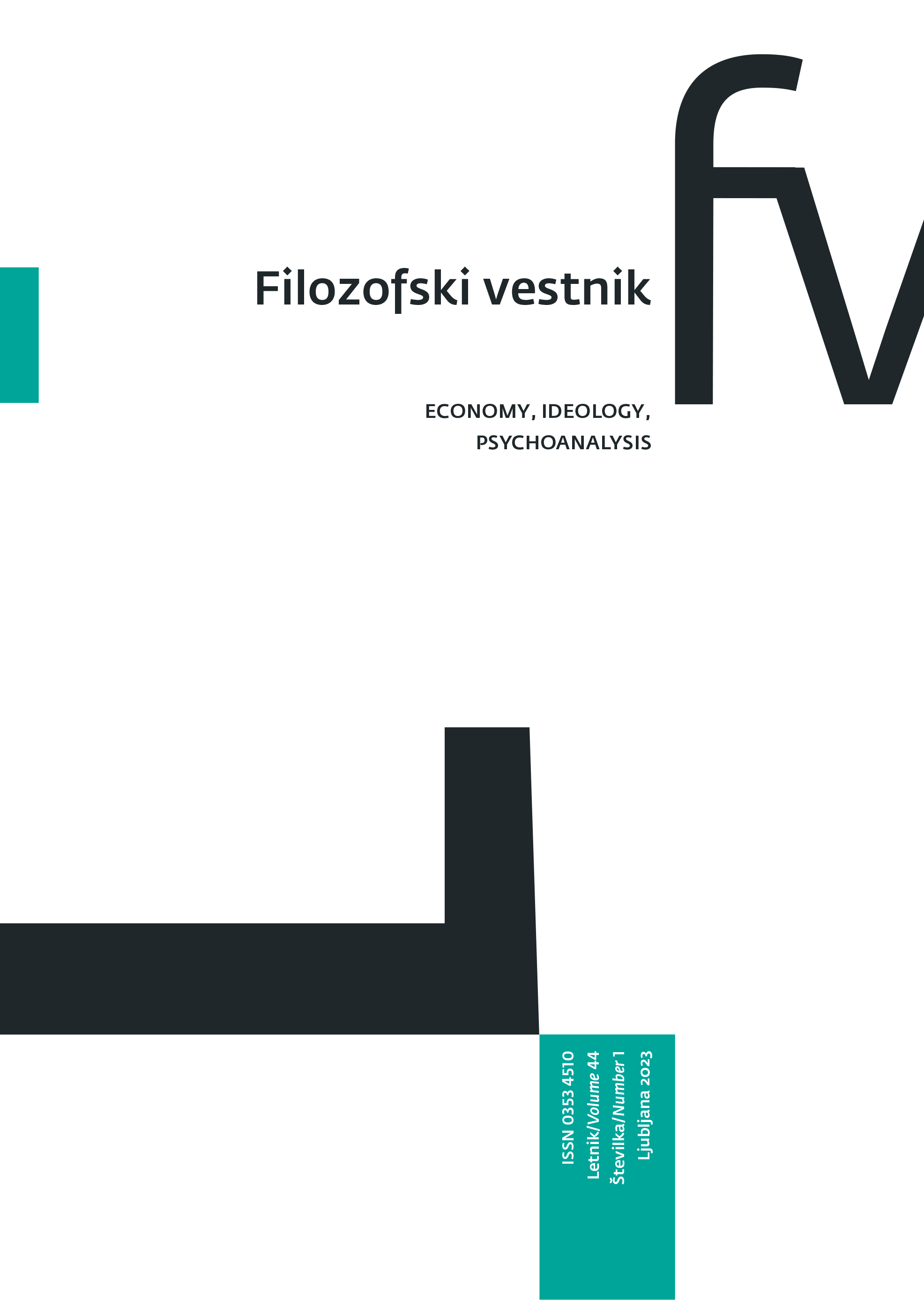Neizrekljivo
perverzija, psihoanaliza, prozopopeja
DOI:
https://doi.org/10.3986/fv.44.1.05Ključne besede:
Freud, Lacan, Miller, perverzija, psihoanaliza, prozopopejaPovzetek
Da bi psihoanaliza spregovorila z glasom »perverzneža«, se neizogibno znajde v klasičnem retoričnem dejanju prozopopeje, v katerem je namišljena, odsotna ali mrtva oseba predstavljena kot govoreča. Če na primer ponovno preberemo klasični esej Jacquesa-Alaina Millerja »O perverziji« (1996), ugotovimo, da je v njem perverznež označen za »neizrekljivega« – v vseh pomenih te besede –, zato ga lahko ventrilokvizira le lik analitika. Medtem ko si analitik prizadeva govoriti v imenu perverzneža, pa pričujoči prispevek trdi, da je perverzno govorno dejanje samo po sebi oblika prozopopeje, ki lahko ventrilokvizira pozicijo subjekta kot histerika, nevrotika, psihotika in celo samega analitika. Na koncu članek trdi, da Millerjev opis odnosa med analitikom in perverznežem, v katerem vsak od njiju ventrilokvizira drugega, kaže na določeno prozopofilijo – ljubezen do prozopopeje –, ki je pogoj za to, da smo sploh govoreči subjekt: vselej govorim za drugega in kot drugi – tudi ali predvsem takrat, ko govorim kot »jaz sam«.
Prenosi
Literatura
Clausewitz, Carl von. On War. Edited and translated by Michael Howard and Peter Paret. Princeton: Princeton University Press, 1984.
Deans, Tim. “The Frozen Countenance of the Perversions.” Parallax 14, no. 2 (2008): 93–114. https://doi.org/10.1080/13534640801990608.
Dolar, Mladen. A Voice and Nothing More. Massachusetts: MIT Press, 2006.
Feher-Gurewich, Judith. “A Lacanian Approach to the Logic of Perversion.” In The Cambridge Companion to Lacan, edited by Jean-Michel Rabaté, 191–207. Cambridge: Cambridge University Press, 2003.
Freud, Sigmund. “The Psychogenesis of a Case of Homosexuality in a Woman (1920).” In Beyond the Pleasure Principle, Group Psychology, and Other Works, 1920–1922, edited by James Strachey, 147–72. Vol. 18 of The Standard Edition of the Complete Psychological Works of Sigmund Freud. London: Hogarth Press, 1955.
Freud, Sigmund. Three Essays on the Theory of Sexuality: The 1905 Edition. Edited by Philippe van Haute and Herman Westerink. Translated by Ulrike Kistner. London: Verso, 2016.
Hoens, Dominik. “Towards a New Perversion: Psychoanalysis.” In Jacques Lacan and the Other Side of Psychoanalysis: Reflections on Seminar XVII, edited by Justin Clemens and Russell Grigg, 88–103. Durham: Duke University Press, 2006.
Jacobus, Mary. “Russian Tactics: Freud’s ‘Case of Homosexuality in a Woman.’ ” GLQ 2, nos. 1 and 2 (1995): 65–79. https://doi.org/10.1215/10642684-2-1_and_2-65.
Lacan, Jacques. The Four Fundamental Concepts of Psychoanalysis. Translated by Alan Sheridan. The Seminar of Jacques Lacan, edited by Jacques-Alain Miller, book 11. New York: W. W. Norton, 1978.
Lacan, Jacques. “Kant with Sade.” In Écrits: The First Complete Edition in English, translated by Bruce Fink, 623–44. New York: W. W. Norton, 2006.
Lacan, Jacques. La relation d’objet, 1956–1957. Le Séminaire de Jacques Lacan, edited by Jacques-Alain Miller, book 4. Paris: Seuil, 1994.
Lacan, Jacques. Anxiety. Translated by A. R. Price. The Seminar of Jacques Lacan, edited by Jacques-Alain Miller, book 10. Cambridge: Polity, 2016.
Lesser, Ronnie C., and Erica Schoenberg, eds. That Obscure Subject of Desire: Freud’s Female Homosexual Revisited. Philadelphia: Routledge, 1999.
Man, Paul de. “Autobiography as Defacement.” MLN 94, no. 5 (December 1979): 919–30. https://doi.org/10.2307/2906560.
Miller, Jacques-Alain. “On Perversion.” In Reading Seminars I and II: Lacan’s Return to Freud, edited by Richard Feldstein, Bruce Fink, and Maire Jannus, 306–20. New York: State University of New York Press, 1996.
Žižek, Slavoj. “Desire: Drive=Truth: Knowledge.” Umbr(a): A Journal of the Unconscious, no. 1 (1997): 147–52.
Prenosi
Objavljeno
Kako citirati
Številka
Rubrike
Licenca
Avtorske pravice (c) 2023 Avtorji

To delo je licencirano pod Creative Commons Priznanje avtorstva-Deljenje pod enakimi pogoji 4.0 mednarodno licenco.
Avtorji jamčijo, da je delo njihova avtorska stvaritev, da v njem niso kršene avtorske pravice tretjih oseb ali kake druge pravice. V primeru zahtevkov tretjih oseb se avtorji zavezujejo, da bodo varovali interese založnika ter da bodo povrnili morebitno škodo.
Podrobneje v rubriki: Prispevki





